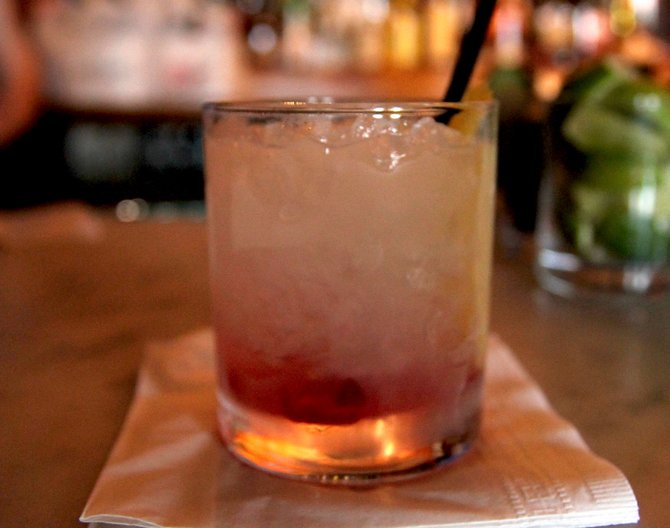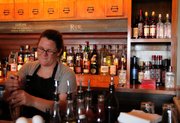The Pink Phosphorescent is one popular drink on the “prescription cocktails” menu. Photo by Melanie Boyd.
Guests enter through the front door into the darkened atmosphere of an after-hours Brent's Drugs. No one is there to greet them. But those in the know don't hesitate. They head for a narrow hallway off the back of the soda fountain, through a curtain and into one of Jackson's newest—and most innovative—bars. The Apothecary at Brent's Drugs, brainchild of attorney Brad Reeves and designer Jonathan Shull, delivers on its promise of speakeasy ambiance and Prohibition flair.
The Apothecary didn't open with a grand opening ceremony or red-ribbon cutting, playing on the speakeasy theme. It seemed to just show up one day. Reeves had no set deadline for the arrival of The Apothecary at all. Avoiding the added pressures of due dates, Reeves had one goal in mind: to do the right thing.
"We said that if we're going to do this, we're going to do it right," Reeves says. After two years of planning and thorough thinking and a quiet arrival, Brent's Drugs' new addition is gaining popularity—the bar had a line out the door most nights in its first week.
Owner Reeves, who bought Brent's Drugs four years ago, wanted to find a balance between the family-oriented vibe of the diner while adding something new. "It's an old building that has some character, and we wanted to embrace that," Reeves says. In all of this, one question was in his mind: How do you balance the fact that this was once a drugstore?
The ingredients used to create such a concoction like The Apothecary included a large amount of research—digging into the pre-Prohibition period, the early beginnings of the pharmaceutical industry and understanding the cocktail-making business.
Reeves' research led him to some interesting findings. "Mississippi was the first state to voluntarily go into Prohibition and the last to come out of Prohibition," Reeves says. He also learned that soda foundations were introduced by way of pharmacies, when pharmacists would mix drinks for patients to help downplay the bitter taste of the medications.
"There were certain syrups that they knew a child couldn't take so they would make it up into a drink," Reeves says. Out of this came phosphate drinks.
The decision making called for discussions between Reeves met with longtime friend Shull, which later led to business consultations with industry leaders of the cocktail scene, Neal Bodenheimer and Kirk Estopinal of Cure, a highly acclaimed bar on Freret Street in New Orleans, La.
Bodenheimer and Estopinal, recognized for their work with a 2013 James Beard Foundation's Outstanding Bar program award, took a trip to Jackson and, while exploring the Fondren area, were impressed with what the area had to offer. The two expressed to Reeves that his space and timing was perfect for creating an establishment like The Apothecary. With the visit to Cure and the advice of Bodenheimer and Estopinal, Reeves and Shull went to the drawing board.
Striving to be a purist by remaining true to the original essence of a pharmacy and soda-fountain scene, Reeves looked to several books and documents, such as Daniel Okrent's "The Last Call: The Rise and Fall of Prohibition" and "Jerry Thomas' Bartender's Guide."
"He (Thomas) was the first person to actually write and publish (a book about cocktail mixing). Now, everybody's going back to his book," Reeves says.
From his research, Reeves found that early bartenders created codes to maintain secrecy of the ingredients of their sought-after drinks. "Bartenders were only as good as their drinks," Reeves says.
Wanting to go back to the golden days of cocktail making, The Apothecary has incorporated into its menu many of the same methods and recipes from Thomas' days. Although time-consuming, The Apothecary choosing to go through the extra labor of hand-squeezing lemons and other fruits for fresh juices, and using draft arms to create their own soda water.
"It may take a little more time, and it may cost a little more, to be honest, but in the end, you come out with a better product," Reeves says. "It's worth it to us, and we think that there are enough people out there that will appreciate that."
The lounge offers a variety of drink selections, ranging from strong and light alcoholic beverages to nonalcoholic beverages. On the "prescription cocktails" menu lies The Doc Noble, a drink named after Brent's very own pharmacists, Shermon "Doc" Noble, known for his enjoyment of whiskey. The Apothecary's Doc Noble combines cayenne and pecan infused rye whiskey, demerara sugar, and lemon. With creative mixologists pushing flavor profiles and creating new combinations, the menu changes nearly nightly.
Like the dedication to keeping the menu era-appropriate, almost every detail of the lounge points to a specific time in history. The wood covering the walls of The Apothecary's entrance is the original wood of the pharmacy, with a pharmacy cabinet from Massachusetts framing the bar and antique pharmacy lamps lighting the tables. "We wanted to leave it raw," Reeves says.
Any inquiring minds who would like to catch a tasteful history lesson, just ask Reeves. His enthusiasm for the topic is contagious. "A lot of people want something old and authentic. Brent's still maintains its character as Brent's, (but by) using the space in the back, we can add more to Brent's," Reeves says.
The Apothecary is open Tuesday through Thursday from 5 p.m. to 10:30 p.m., with extended hours to 12:30 a.m. on Friday and Saturday.



